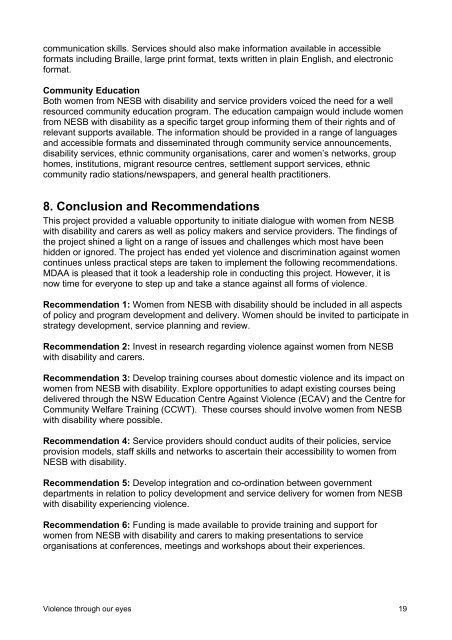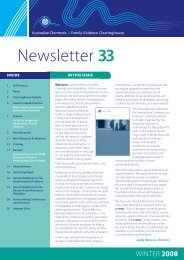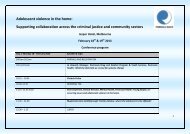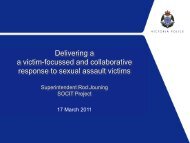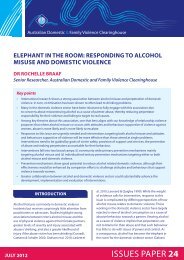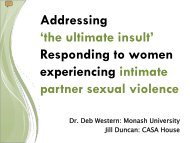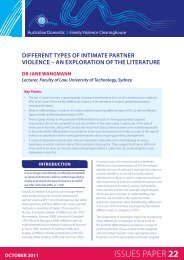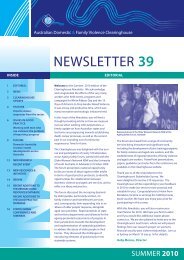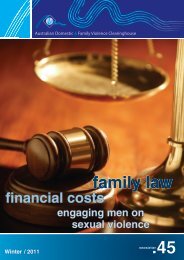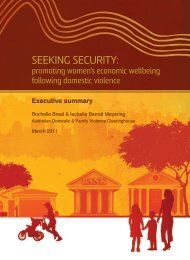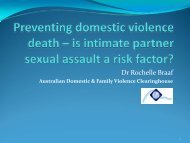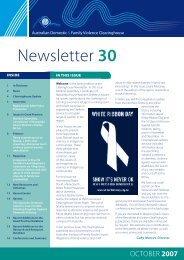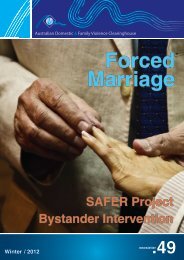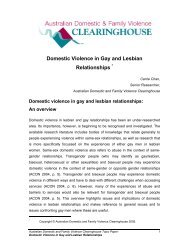Violence through our eyes - Women With Disabilities Australia
Violence through our eyes - Women With Disabilities Australia
Violence through our eyes - Women With Disabilities Australia
You also want an ePaper? Increase the reach of your titles
YUMPU automatically turns print PDFs into web optimized ePapers that Google loves.
communication skills. Services should also make information available in accessible<br />
formats including Braille, large print format, texts written in plain English, and electronic<br />
format.<br />
Community Education<br />
Both women from NESB with disability and service providers voiced the need for a well<br />
res<strong>our</strong>ced community education program. The education campaign would include women<br />
from NESB with disability as a specific target group informing them of their rights and of<br />
relevant supports available. The information should be provided in a range of languages<br />
and accessible formats and disseminated <strong>through</strong> community service announcements,<br />
disability services, ethnic community organisations, carer and women’s networks, group<br />
homes, institutions, migrant res<strong>our</strong>ce centres, settlement support services, ethnic<br />
community radio stations/newspapers, and general health practitioners.<br />
8. Conclusion and Recommendations<br />
This project provided a valuable opportunity to initiate dialogue with women from NESB<br />
with disability and carers as well as policy makers and service providers. The findings of<br />
the project shined a light on a range of issues and challenges which most have been<br />
hidden or ignored. The project has ended yet violence and discrimination against women<br />
continues unless practical steps are taken to implement the following recommendations.<br />
MDAA is pleased that it took a leadership role in conducting this project. However, it is<br />
now time for everyone to step up and take a stance against all forms of violence.<br />
Recommendation 1: <strong>Women</strong> from NESB with disability should be included in all aspects<br />
of policy and program development and delivery. <strong>Women</strong> should be invited to participate in<br />
strategy development, service planning and review.<br />
Recommendation 2: Invest in research regarding violence against women from NESB<br />
with disability and carers.<br />
Recommendation 3: Develop training c<strong>our</strong>ses about domestic violence and its impact on<br />
women from NESB with disability. Explore opportunities to adapt existing c<strong>our</strong>ses being<br />
delivered <strong>through</strong> the NSW Education Centre Against <strong>Violence</strong> (ECAV) and the Centre for<br />
Community Welfare Training (CCWT). These c<strong>our</strong>ses should involve women from NESB<br />
with disability where possible.<br />
Recommendation 4: Service providers should conduct audits of their policies, service<br />
provision models, staff skills and networks to ascertain their accessibility to women from<br />
NESB with disability.<br />
Recommendation 5: Develop integration and co-ordination between government<br />
departments in relation to policy development and service delivery for women from NESB<br />
with disability experiencing violence.<br />
Recommendation 6: Funding is made available to provide training and support for<br />
women from NESB with disability and carers to making presentations to service<br />
organisations at conferences, meetings and workshops about their experiences.<br />
<strong>Violence</strong> <strong>through</strong> <strong>our</strong> <strong>eyes</strong> 19


